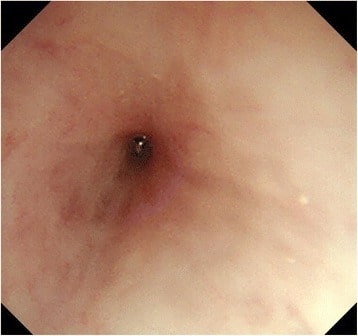Playlist
Show Playlist
Hide Playlist
Esophageal Diverticula with Case
-
Slides Gastroenterology 05 Esophageal Diseases.pdf
-
Reference List Gastroenterology.pdf
-
Download Lecture Overview
00:01 Let's move on to our next case. 00:03 We have 55-year-old man who presents to clinic complaining of several months of difficulty swallowing. 00:09 He notes mild chest discomfort immediately after swallowing. 00:12 He sometimes regurgitates undigested food and complains of bad breath. 00:17 He has lost 3 kg unintentionally. 00:19 He does not smoke or drink alcohol, and denies any symptoms of acid reflux. 00:24 On exam, vitals are normal. His abdominal exam and oropharyngeal exam are both unremarkable. 00:32 What is the best diagnostic step to confirm the diagnosis here? So let's go through some key features. 00:38 He has chronic dysphagia, he has regurgitation and halitosis or bad breath, and a pretty normal physical exam. 00:49 So let's talk a bit about esophageal diverticula. 00:52 Esophageal diverticula can form due to muscular weakness in the esophageal wall that usually results from an underlying motility disorder. 01:00 So the most common type here is called a Zenker diverticulum. 01:05 Over here on the right you can see in our diagram that with weakness in the esophageal wall, anti-pressure eventually there's an outpouching that forms through the cricopharyngeal muscle in the upper third of the esophagus. 01:17 This outpouching is called the Zenker's diverticulum. 01:21 Patients may present with dysphagia, halitosis, they may have regurgitation of undigested food, chest pain, and chronic cough. 01:30 The diagnosis is made by doing a barium swallow and treatment is with a myotomy to relieve the high pressure and to correct the underlying motility disorder. 01:43 So now let's return to our case. 01:45 We have a 55-year-old man with chronic dysphagia, frequent regurgitation and halitosis, and a pretty normal physical exam. 01:53 So all of these thing should lead you to think about features of his esophageal diverticula and know that the best diagnostic step is a barium swallow.
About the Lecture
The lecture Esophageal Diverticula with Case by Kelley Chuang, MD is from the course Disorders of the Esophagus and the Stomach.
Included Quiz Questions
What is the most common location for a Zenker diverticulum?
- Upper third of the esophagus
- Gastroesophageal junction
- Anterior wall near the tracheal bifurcation
- Midpoint of the esophagus
- Lower esophageal sphincter
Customer reviews
5,0 of 5 stars
| 5 Stars |
|
5 |
| 4 Stars |
|
0 |
| 3 Stars |
|
0 |
| 2 Stars |
|
0 |
| 1 Star |
|
0 |




